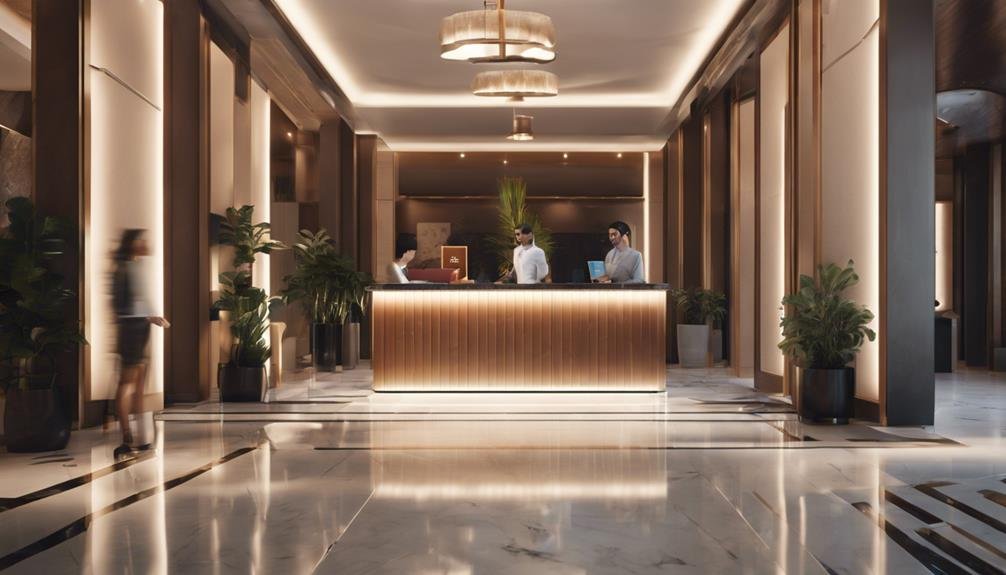Touch-Free Travel: The Rise of Contactless Services in the Hospitality Sector
The hospitality sector is witnessing a surge in touch-free travel solutions, emphasizing efficiency, safety, and convenience. Contactless services like check-in processes are becoming standard, improving arrival experiences and safety measures by reducing physical contact. Mobile room keys offer enhanced security and personalized access, streamlining check-ins with biometric authentication methods. Automated concierge services enhance guest experiences, provide tailored recommendations, and collect valuable data insights. Contactless dining experiences elevate hygiene, efficiency, and customer satisfaction while minimizing physical contact. Virtual room tours offer immersive exploration, aiding decision-making and showcasing innovative technologies in the hospitality industry. The future of touch-free travel is shaping a new guest experience standard.
Key Takeaways
- Contactless services streamline arrival processes and enhance safety in hospitality.
- Mobile room keys offer secure and personalized access, improving check-in efficiency.
- Automated concierge services enhance guest experiences and provide tailored recommendations.
- Contactless dining minimizes physical contact, improving hygiene and customer satisfaction.
- Virtual room tours provide immersive experiences, aiding decision-making and setting hotels apart.
Evolution of Contactless Check-in
Gradually becoming a standard practice in the hospitality industry, the evolution of contactless check-in has revolutionized the guest experience by streamlining the arrival process and enhancing safety measures. By offering efficient processes and seamless experiences, hotels have embraced technology to meet the demands of modern travelers. Contactless check-in allows guests to bypass traditional front desk queues, enabling them to complete the check-in process swiftly through their own devices. This not only saves time for both guests and staff but also reduces physical contact, contributing to a safer environment amidst health concerns.
The implementation of contactless check-in systems has notably improved operational efficiency for hotels, with data showing a marked reduction in check-in times and an increase in overall guest satisfaction rates. Additionally, the seamless experience provided by contactless check-in contributes to a positive first impression for guests, setting the tone for their entire stay. As the hospitality industry continues to adapt to changing consumer preferences, contactless check-in has emerged as a key differentiator in providing a modern and safe guest experience.
Benefits of Mobile Room Keys
Mobile room keys offer a range of benefits in the hospitality sector. These include enhanced security features that provide peace of mind for both guests and hotel management. The convenience of a streamlined check-in process through mobile keys can greatly improve operational efficiency and guest satisfaction.
Additionally, the ability to customize the guest experience through personalized room access adds a touch of luxury and exclusivity to their stay.
Enhanced Security Features
The implementation of mobile room keys in the hospitality sector has revolutionized security measures by incorporating enhanced features that prioritize guest safety and convenience.
By integrating biometric authentication methods such as fingerprint or facial recognition, mobile room keys provide an additional layer of security, ensuring that only authorized individuals can access designated areas.
Moreover, these keys facilitate secure transactions by encrypting guest information and payment details, reducing the risk of fraud or identity theft.
The use of mobile room keys not only streamlines the check-in process but also enhances overall security protocols within the hospitality industry.
With these advanced security features, guests can have peace of mind knowing that their personal information and belongings are safeguarded during their stay.
Convenient Check-In Process
Incorporating mobile room keys in the hospitality sector has greatly streamlined the check-in process, enhancing efficiency and guest satisfaction. Fast check-in is now a reality with the use of mobile room keys, allowing guests to bypass the front desk and head straight to their rooms upon arrival. Remote registration further expedites the check-in process, enabling guests to provide necessary information and payment details beforehand. This not only saves time but also reduces physical contact, promoting a safer and more convenient experience for guests. The convenience and speed offered by mobile room keys play a significant role in enhancing the overall guest experience and setting a new standard for efficient check-in processes.
| Benefits of Mobile Room Keys | ||
|---|---|---|
| Fast Check-In | Remote Registration | Enhanced Guest Satisfaction |
Customized Guest Experience
Enhancing the guest experience through personalized services facilitated by mobile room keys has become a pivotal strategy in the hospitality sector's evolution towards contactless solutions. By utilizing mobile room keys, hotels can cater to guests' personalized preferences seamlessly. Guests can have control over their check-in process, room selection, and even access to special amenities through their mobile devices. This level of customization not only enhances convenience but also fosters a sense of exclusivity and care, leading to higher guest satisfaction and loyalty.
Moreover, mobile room keys enable hotels to offer targeted promotions based on guest behavior and preferences, further enriching the overall guest experience. Overall, the integration of mobile room keys into the guest experience represents a significant advancement in providing tailored and contactless services in the hospitality industry.
Automated Concierge Services
With advancements in technology revolutionizing the hospitality industry, the implementation of Automated Concierge Services has emerged as a strategic solution for enhancing guest experiences and operational efficiency. These automated services offer guests a seamless and personalized interaction throughout their stay. By incorporating Artificial Intelligence (AI) and machine learning algorithms, hotels can provide tailored recommendations, streamline check-in and check-out processes, and offer 24/7 assistance for guest inquiries.
Automated Concierge Services not only elevate the guest experience but also contribute to operational efficiency. By automating routine tasks such as booking reservations, providing local area information, or arranging transportation, hotel staff can focus on delivering higher-touch services that require human interaction. This shift allows for a more efficient allocation of resources, leading to cost savings and improved service quality.
Moreover, the data collected through automated services enable hotels to gain valuable insights into guest preferences and behavior, allowing for targeted marketing strategies and further personalization. As the hospitality industry continues to embrace digital transformation, Automated Concierge Services stand out as a key component in driving guest satisfaction and loyalty.
Contactless Dining Experiences
Amid evolving consumer preferences and health considerations, the hospitality sector is increasingly adapting to contactless dining experiences. Contactless menu ordering and touchless payment options have become pivotal in enhancing the safety and convenience of dining out.
| Benefits of Contactless Dining Experiences | ||
|---|---|---|
| 1. Enhanced Hygiene | 2. Increased Efficiency | 3. Improved Customer Satisfaction |
| By minimizing physical contact with menus and payment terminals, the risk of germ transmission is greatly reduced. | Ordering and paying through mobile apps or QR codes streamlines the dining process, leading to quicker table turnover. | Customers appreciate the seamless and modern approach to dining, which can positively impact their overall dining experience. |
Restaurants that embrace contactless dining experiences are not only meeting the current demands for safety but are also aligning with the digital transformation trends in the industry. As technology continues to advance, we can expect further innovations in this space to redefine the future of dining out.
Virtual Room Tours
Additionally, virtual room tours in the hospitality sector offer a dynamic and immersive way for customers to explore accommodations remotely. By leveraging interactive technology, hotels can provide guests with immersive experiences that closely replicate physical visits. Through virtual room tours, potential guests can navigate through various room types, amenities, and even common areas, enhancing their understanding of the property and aiding in decision-making.
These virtual tours not only showcase the physical aspects of the rooms but can also incorporate additional information overlays, such as details about the hotel's services, nearby attractions, or booking promotions. This interactive approach helps to engage potential customers on a deeper level, increasing the likelihood of conversion. Additionally, virtual room tours can be accessed conveniently from any location, allowing guests to explore at their own pace and revisit areas of interest.
Hotels that invest in virtual room tours demonstrate a commitment to embracing innovative technologies to enhance the guest experience, setting themselves apart in a competitive industry driven by customer satisfaction and convenience.
Enhancing Guest Safety Measures
Incorporating stringent safety protocols and implementing contactless check-in procedures are pivotal in elevating guest safety measures within the hospitality sector.
By leveraging technology to streamline processes and reduce physical touchpoints, hotels can enhance the overall guest experience while prioritizing health and well-being.
These measures not only demonstrate a commitment to guest safety but also align with the evolving expectations of travelers in a post-pandemic world.
Safety Protocols Implementation
How can the hospitality sector effectively enhance guest safety measures through the implementation of rigorous safety protocols in contactless services?
Safety training plays an essential role in ensuring staff are well-versed in sanitation guidelines and best practices to maintain a clean and hygienic environment. By providing thorough safety training programs, employees can better understand the importance of upholding strict sanitation guidelines to protect both themselves and guests.
These protocols should encompass proper sanitation of high-touch surfaces, use of personal protective equipment, and adherence to social distancing measures. Regular reinforcement of these protocols through ongoing training sessions and performance evaluations can help instill a culture of safety consciousness within the hospitality sector, ultimately enhancing guest confidence in the safety of contactless services.
Contactless Check-In Procedures
To optimize guest safety measures, the hospitality sector can implement streamlined contactless check-in procedures that prioritize efficiency and hygiene. By integrating efficient processes, such as online pre-registration and mobile key technology, hotels can offer guests a seamless experience while minimizing physical touchpoints.
Research shows that contactless check-in not only enhances guest satisfaction but also improves operational efficiency. According to a recent survey by a leading hospitality research firm, 87% of guests prefer hotels with contactless check-in options. This data underscores the growing importance of technology-driven solutions in the hospitality industry.
Embracing contactless check-in procedures not only aligns with current health and safety standards but also enhances the overall guest experience, positioning hotels at the forefront of innovation.
Streamlining Hotel Payments
Efficient and secure payment processes play a crucial role in the seamless operation of hotel services. With the increasing demand for touchless experiences, streamlining hotel payments has become a key focus for the hospitality sector. One of the most significant advancements in this area is the integration of mobile payments, allowing guests to settle their bills conveniently and securely through their smartphones. This not only enhances the overall guest experience but also improves operational efficiency for hotel staff.
To illustrate the impact of streamlining hotel payments, consider the following table showcasing the benefits of mobile payments in the hospitality sector:
| Benefits of Mobile Payments | Description |
|---|---|
| Enhanced Guest Experience | Provides a seamless transaction process for guests. |
| Improved Operational Efficiency | Reduces waiting times at the front desk. |
| Secure Transactions | Guarantees the safety of guest payment information. |
| Cost Savings | Minimizes the need for traditional POS systems. |
Incorporating mobile payments into hotel operations can lead to smoother transactions, increased guest satisfaction, and a more efficient payment process overall.
Future of Touch-Free Travel
Amid the evolving landscape of the hospitality industry, the future of touch-free travel is poised to revolutionize the way travelers engage with various services and amenities. As technology continues to advance and consumer preferences shift towards seamless experiences, touchless travel amenities are becoming increasingly prevalent. This shift is not only a response to the current global health crisis but also a reflection of the growing demand for convenience and efficiency in the travel sector.
- Biometric Check-ins: Biometric technology such as facial recognition and fingerprint scans will streamline the check-in process, eliminating the need for physical contact and reducing wait times.
- Mobile Room Keys: Guests will be able to use their smartphones to access their rooms, enhancing security and providing a contactless alternative to traditional key cards.
- Virtual Concierge Services: AI-powered virtual assistants will offer personalized recommendations and services, enhancing guest experiences while minimizing physical interactions.
- Contactless Payments: The widespread adoption of mobile payment solutions and digital wallets will enable guests to settle bills without the need for physical cash or cards, ensuring a seamless check-out experience.
Conclusion
To sum up, the emergence of touch-free services in the hospitality sector signifies a shift towards convenience and efficiency for both guests and establishments.
As technology continues to advance, contactless check-ins, mobile room keys, automated concierge services, and virtual room tours have become essential tools in enhancing guest experiences.
By prioritizing safety measures and streamlining processes, hotels are adapting to meet the evolving needs of travelers in a rapidly changing world, painting a picture of a seamless and secure future in touch-free travel.







